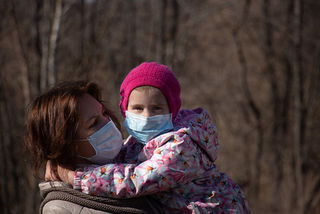Coronavirus Disease 2019
Genealogy Provides the Strength to Persevere
Knowing your family's past can help you get through a crisis.
Posted April 13, 2020 Reviewed by Lybi Ma

While history helps us understand the present by knowing the past, family history makes that past personal. As Jason Harrison, a manager at the Family History Library in Salt Lake City, told me, “Your ancestors’ story is part of your story. Understanding what they experienced, and what they did, better helps you understand yourself.” As the COVID-19 pandemic sweeps over this nation, I’ve been thinking about how genealogy provides context to our suffering, and the strength to persevere.
I met Jason a few years ago when I toured the Family History Library, which is the largest genealogical library in the world, run by The Church of Jesus Christ of Latter-day Saints. Jason guided me through the library’s resources and told me stories about how genealogy had enhanced his understanding of the world and buoyed him when times were hard.
He told me that when he and his wife had lost a baby some years before, his wife’s discovery that her own late grandmother had also lost a baby had offered them strength and succor in the midst of that tragedy. Afterward, the couple managed to find the unmarked spot where that long-ago baby had been buried because the family was too poor to afford a headstone, and to have a marker placed on the baby’s grave.
What I realized in talking with Jason is that there is something reassuring about knowing we have been here before, even if we’ve never experienced precisely this. Modernity’s comforts and privileges can make us feel pretty distant from the indignities, squalor and primitive health care of the past – we have antibiotics after all! – but a modern-day illness that spreads easily with no vaccine or certain cure reminds us that we are not invulnerable. We need to know how people get through something like this when they can. Genealogy offers us aid.
Over the last few years, in research for The Lost Family: How DNA Testing Is Upending Who We Are, I’ve had the chance to interview a lot of genealogists about a hobby that borders on obsession for many, and I’ve dabbled in it enough to understand why they get hooked. Since the coronavirus outbreak hit, I’ve been asking genealogists how their hobby is shaping this particular moment, and hearing their family stories about the polio epidemic, the Spanish flu, smallpox, tuberculosis, and war. They talk about who died and what they left behind. They talk about how the survivors handled these tragedies, and how the legacy of these moments was passed down – in journals and tape recordings, in lasting anxiety and trauma, in children named after the dead.
Genealogist Jennifer Mendelsohn told me that her paternal grandfather’s story of loss during a similar pandemic a century ago especially resonates right now. He was the only one of 10 siblings to live past his 20s. In 1918, he lost his wife to the Spanish flu, then his only living brother two days later.
Without genealogy, people from the past can feel abstract to us; looked at in aggregate, a tragedy like the Spanish Flu can melt into an abstract horror. But when you have a connection to someone who went through such a tragedy, the circumstances are much more real and relatable. And if the people of the past are real to us, this means we are not so different from them. This means they have much to teach us.
“It's easy to think that the people who lived through things like the flu epidemic or the Holocaust were somehow constitutionally different or better equipped; I think we mythologize them,” says Mendelsohn, who is also the founder of the social media movement #resistancegenealogy. “But they weren't. They were just as scared and confused and heartbroken as we are right now.”
Mendelsohn told me she tries to remind herself that, “as mind-numbingly awful as the 1918 pandemic was, the world didn't come to a complete stop. People got through it, as heartbreaking as that could be for some. They just kept going, and I'm trying to remember that that's what we'll have to do, too.”
Family history offers lessons that can be bracing, cruel, and optimistic, sometimes all at once. They are lessons in the tenuousness of life, and in endurance. My sister-in-law, who has been researching her family history for years, told me about a baby in Minnesota in the early 1900s. He was conceived during a tuberculosis outbreak – his father had gone to visit his mother, who was already ill and in isolation – and within a few years, the little boy lost both his parents to the disease. He lived on to become her grandfather.
And family history can be a means of connection and solace. Historian and professor Honor Sachs wrote recently on Twitter about a student who enlisted her grandmother’s help for a class project on genealogy and history. The daily phone calls helped both grandmother and granddaughter with their anxiety and separation; the shared excavation of the past offered comfort at a time when the future is unknown and frightening. “To cope with the uncertainty,” Sachs tweeted, “they tell stories about the past, fill in gaps to make something whole.”
A family friend, Marcia Roberts Gregorio, told me she recently began rereading the journal her late father kept during World War II. She found much about her father’s experience from 75 years ago feels relevant today: the endless waiting and wondering in between stints on the front lines; the fear and the dread. Marcia's father was not ashamed to admit that he was afraid. “Terribly afraid,” he wrote. “But my pals are afraid, too, and we depend upon each other.” This idea – that we are in this together, that all of us need to do our very best at all times, not just for ourselves but for one another – seems especially resonant now.
Family history teaches what’s possible. As Jason Harrison put it about his ancestors: “As we learn about things they went through, the hardships they endured, sometimes that helps us endure our own hardships.” We are all of us the legacy of ordinary people, people who set out for new places and fought wars and kept working hard when they were tired and kept being brave when they were scared. We are the products of their ingenuity, their luck, their stubbornness.
Mendelsohn thinks of her husband’s grandmother, who survived the Holocaust. “I always remind myself that before she was selling things on the black market to survive during WWII after losing her entire family, my husband's grandmother was...a 20-something seamstress,” she says. “Not a soldier, or a rebel, or a survivalist. An ordinary seamstress from a small town. She just rose to the challenge, and I have to hope we will, too.”
Facebook image: bbernard/Shutterstock




